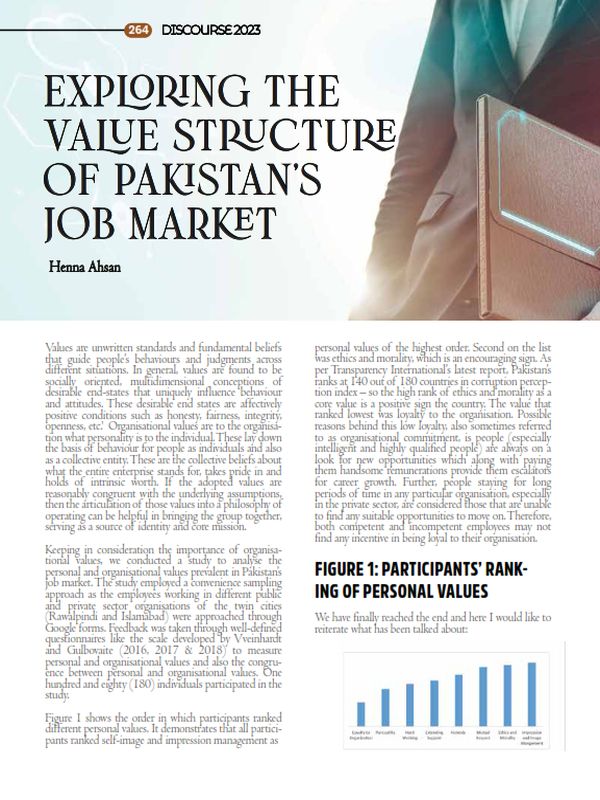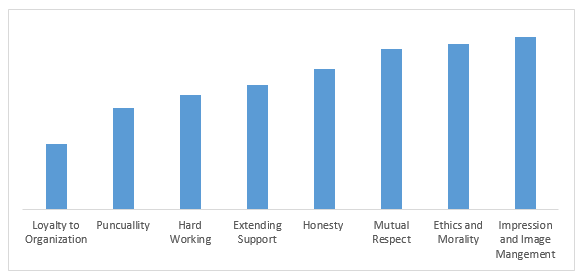Exploring the Value Structure of Pakistan’s Job Market
Values are unwritten standards and fundamental beliefs that guide people’s behaviours and judgments across different situations. In general, values are found to be socially oriented, multidimensional conceptions of desirable end-states that uniquely influence behaviour and attitudes. These desirable end states are affectively positive conditions such as honesty, fairness, integrity, openness, etc.[1] Organisational values are to the organisation what personality is to the individual. These lay down the basis of behaviour for people as individuals and also as a collective entity. These are the collective beliefs about what the entire enterprise stands for, takes pride in and holds of intrinsic worth. If the adopted values are reasonably congruent with the underlying assumptions, then the articulation of those values into a philosophy of operating can be helpful in bringing the group together, serving as a source of identity and core mission.
Keeping in consideration the importance of organisational values, we conducted a study to analyse the personal and organisational values prevalent in Pakistan’s job market. The study employed a convenience sampling approach as the employees working in different public and private sector organisations of the twin cities (Rawalpindi and Islamabad) were approached through Google forms. Feedback was taken through well-defined questionnaires like the scale developed by Vveinhardt and Gulbovaite (2016, 2017 & 2018) to measure personal and organisational values and also the congruence between personal and organisational values. One hundred and eighty (180) individuals participated in the study.
Figure 1 shows the order in which participants ranked different personal values. It demonstrates that all participants ranked self-image and impression management as personal values of the highest order. Second on the list was ethics and morality, which is an encouraging sign. As per Transparency International’s latest report, Pakistan’s ranks at 140 out of 180 countries in corruption perception index – so the high rank of ethics and morality as a core value is a positive sign the country. The value that ranked lowest was loyalty to the organisation. Possible reasons behind this low loyalty, also sometimes referred to as organisational commitment, is people (especially intelligent and highly qualified people) are always on a look for new opportunities which along with paying them handsome remunerations provide them escalators for career growth. Further, people staying for long periods of time in any particular organisation, especially in the private sector, are considered those that are unable to find any suitable opportunities to move on. Therefore, both competent and incompetent employees may not find any incentive in being loyal to their organisation.
Figure 1: Participants’ Ranking of Personal Values
Regarding the importance of personal values, research shows that honesty leads a person to develop a strong moral character, to learn good behaviour, and maintain discipline – and ultimately such an attitude may manifest in a person being punctual on his/her job. Our results also show that in terms of personal values punctuality and honesty have the highest level of correlation, meaning that people who are high in honesty may also be more punctual on their jobs. Similarly, it is also observed that extending support and mutual respect are also highly correlated. This indicates that support is usually extended to peers and subordinates/supervisors in organisations where mutual respect is high. Mutual respect is extremely important both in professional and personal relationships. With mutual respect, we celebrate unique perspectives, opinions, and experiences that other people bring. It also encourages open dialogue where everyone can share their thoughts and feelings comfortably, and respond to each person with politeness, kindness, and understanding.
We all know that effective and open communication can encourage employees to trust and connect with each other and with their organisation. The importance of trust for organisations is manifested in the fact that honesty and openness go hand by hand in good organisations. Our results also confirm that there is a high degree of correlation between organisational values like openness and honesty. This may indicate that organisations that nurture openness may also help inculcate values of honesty amongst their employees. Employees consider an organisation open and honest when the job-related issues and company visions are communicated in an open manner to all stakeholders, and this subsequently leads to the strengthening of trust.
Further, it is also observed that conducive environments in organisations help promote creativity. Ideal work environments are set up in a manner that makes it easy for team members to collaborate and by providing ample communal space for people to talk and swap ideas. Such workplaces encourage creative thinking exercises, such as regular ‘brainstorms or scrums’[2]. Similarly, our results also establish that constructive feedback in any organisation can be helpful in nurturing creativity by providing new perspectives and insights which can spark imagination or challenge assumptions. It can also encourage experimentation, recognise strengths and achievements, help identify areas of improvement, and build trust among peers.
Results further showed that almost all employees highly rated values like honesty, loyalty to the organization, etc. – however, women seem to be leading men on some values such as extending support, mutual respect, punctuality, and hard work. Due to cooperative nature of women and their ability to maintain interpersonal relationships with high levels of trust, they are likely to exceed men in traits such as extending support[3]. Further studies also show that women are more likely to put extra effort into getting the assigned tasks done and also have a high task completion rate than men in many organisations.
Mean trends on organisational values also show encouraging figures for all attributes such as honesty, openness, conducive environment, etc. and here the private sector seems to be leading some fronts such as fairness, openness and creativity. Public sector organisations in Pakistan are usually governed by set rules and regulations and with a high level of conformity which leaves little room for creativity and innovation. Whereas such values are the major driving force for many private organisations as these provide a competitive edge over rivals, hence the high rating of values such ass openness and creativity in the private sector. Further strict accountability practices and vulnerability of job in private sector may prevent people from indulging in unfair practices and therefore private sector is also leading on this front.
One of the interesting findings of this study is that openness in organisation has a low mean value for low and high levels of hierarchy, however the organisations where hierarchy level is moderate this value is at its highest. It is possible that in an organisations with low levels of hierarchy people may fear opening up whilst having conversations with authority figures. Similarly, with huge levels of hierarchy people may feel they have no say at all in organisational matters and thus prefer to stay at a distance from their colleagues.
An effective set of values could only be developed when input from all stakeholders is made part of the process. This should involve bringing to light the real tenets of the company’s philosophy and how employees perceive them. In fact, it should be a three-pronged process: employees articulating their own set of values, company or top management laying down their vision statement or goals, and the development of mechanisms that can ensure constant communication between the two to ensure that sets of values are aligned to the maximum possible extent.
The author is a Research Economist at the Pakistan Institute of Development Economics (PIDE), Islamabad.
[1] Williams, Sandra L. (2002) “Strategic planning and organisational values: Links to alignment.” Human Resource Development International 5, 217-233.
[2] Burbiel, J. (2009). Creativity in research and development environments: A practical review. International Journal of Business Science & Applied Management, 4(2), 35-51.
[3] Hive. (2020). State of the Workplace – Part 1: Gender. Retrieved from https://hive.com/state-of-the-workplace/gender-2018/





